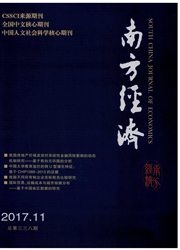

 中文摘要:
中文摘要:
本文从委托代理视角出发,考查中国转型期政府行为与市场的关系,试图将目标函数设定为委托人与代理人的收益之和,从而兼顾二者的利益共生性,再结合当事人风险偏好的消长变化以及各类事业不确定性的大小,推演出:集权化、自由化及折衷化均可成为转型期政府与市场在不同条件下的最优制度安排,并以中国近30年来的产业政策为案例,揭示出政府决策背后财事权平衡的内在逻辑。
 英文摘要:
英文摘要:
Based on a principal - agent analysis, this article has examined the government - market relation in China since its opening- up, while innovatively regarding a collective benefit as the objective function to be maximized. It concludes that "free market", "central planning" and "their mix" can all be the optimal option for government but thcy are subjected to levels of players' risk tolerance and uncertainties of toasks. The result is also partially verified by China' s economic success in the recent 30 years, and can be reasoned through the "balance budget" philosophy.
 同期刊论文项目
同期刊论文项目
 同项目期刊论文
同项目期刊论文
 期刊信息
期刊信息
